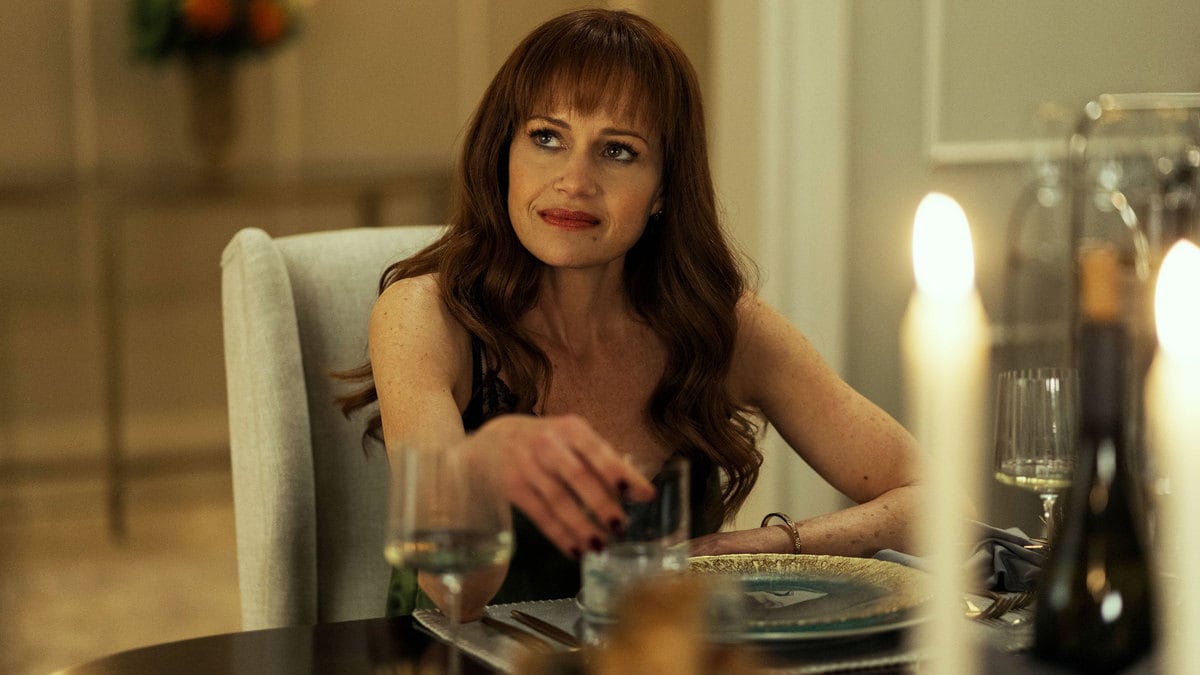Ryan Murphy isn’t the only showrunner who has a reliably great pool of actors to put through different scary scenarios. Across Mike Flanagan’s expanding universe, Carla Gugino has played a ghost, a mother on the verge of a breakdown, a broken-hearted narrator, and a wife handcuffed to a bed. Thanks to The Fall of the House of Usher, she can, among other things, add a bartender, a woman with a medical crisis, a sex worker, a security guard, death, a raven, and a chimpanzee to the list.
If you are worried your mind started wandering while reading that list and you are now in an Edgar Allan Poe-induced fever dream, fear not, as Gugino really does inhabit all of those identities in Flanagan’s last spooky limited-series Netflix offering—yes, including the chimpanzee.
Gugino’s impressive ability to simultaneously portray contradictory emotions has been utilized with maximum effect by Flanagan in the past. In Usher, the showrunner has given one of his frequent collaborators an even larger supernatural playground to showcase dueling emotions, calling on her to lean into preposterous scenarios (like mimicking an ape) without breaking a sweat. The chimpanzee moment in Episode 2 is one that walks up to the line of absurdity, especially so early in the season, but it works, and I’m pretty sure that is all because of Gugino.
Rather than simply adapting one Poe story into a series that ends up being a thinly veiled depiction of the infamous Sackler pharmaceutical dynasty, Flanagan rolls the dice on the complete works of the Gothic writer and combines elements from the creepy collection of short stories and poems. As Verna (word puzzle fans will notice this is an anagram for “raven”), Gugino plays the ultimate puppet master, orchestrating the titular collapse of the Usher family. Considering how much revelry the twisted tales feature, it is stiff competition, but no one is having more fun leaning into the layers of this delectably macabre setting than Gugino.

In the series premiere, pharmaceutical titan Roderick Usher (Bruce Greenwood) mourns the death of his six children, who have recently perished in separate disturbing and violent incidents, beginning with his youngest Prospero (Sauriyan Sapkota) and ending with first-born Frederick (Henry Thomas). Across eight episodes, Verna—and Gugino—take on different personas to dish out the finer details of a deal made on New Year’s Eve more than 40 years ago.
Heavy eyeliner is a favored signature that frames Gugino’s expressive eyes, whether she’s purring an alluring observation or delivering a heartfelt parting. It is a role that is equally beguiling and menacing, depending on which sibling is about to meet their end and how Joker-like elastic her smile becomes. An array of wigs and clothing ranging allow her some anonymity as she portrays figures as disparate as a grungy cat shelter worker and a delectable Gothic triumph—someone should cast Gugino on Wednesday based on this look alone.
Thankfully, though, that masquerading doesn’t extend to sporting old-school Planet of the Apes prosthetics during the chimpanzee sequence.
Aping Around
Verna’s second kill occurs in the episode named after Poe’s famous “The Murders in the Rue Morgue,” which is cited as the first modern detective fiction story, and features an unusual killer. The culprit? An Ourang-Outan (or orangutan as this animal is know today) escaped a Parisian apartment armed with its owner’s straight razor, played here by Gugino as a chimpanzee.
Of all the nods to Poe, a killer ape is perhaps the most bizarre, but Gugino is more than game, leaning into the animalistic movements this bonkers set-up requires. Verna first becomes a DGAF security guard alias, before going full method as a chimpanzee.
Camille (Kate Siegel) attempts to uncover her sister Victoire’s (T’Nia Miller) disturbing and illegal work on apes at a secure facility. The soon-to-be next victim treats Verna like shit because of her pricey shoes and finds her nothing more than a petty inconvenience. In response, Gugino’s voice deepens and becomes more laconic, emphasizing her unbothered reaction to Camille’s threats of getting her fired. She might as well have a cigarette dangling from her mouth.
Things like time and space don’t restrict Verna, so her appearance in the same room as Camille after she has entered the off-limits space housing several caged chimpanzees is not unexpected—especially as we know Camille’s death is imminent. However, I wasn’t expecting Verna to go from dishing out a history lesson on animal testing (apparently, the Ancient Greeks started it in the fourth century BCE) to leaping on the center table like a woman possessed. Or, should I say ape-possessed?

Either way, Gugino’s physicality quickly transforms from a hunched-over security guard to an ape sizing up a threat. Presumably, some wire work aided this jump, but what follows is all Gugino as she mimics the primates in this room and turns what could be a ridiculous scene into one that is scary and ridiculous—all while giving a literal voice to the animals that are harmed in the name of so-called science.
Watching this unfold half in fear and far incredulous (my expression matches what is onscreen), Siegel reduces some of the overt WTF elements with a certain amount of dry wit that runs throughout the series. Overall, Usher isn’t as impactful as titles like The Haunting of Hill House and The Haunting of Bly Manor, but its dark humor balances out some of the sillier sequences, including this one.
It also helps that Gugino leans all the way into the ape persona while her scene partner ultimately says “fuck it” to her fate. It doesn’t get much weirder than this, and Gugino embodies the brutal menace and overall distress experienced by the test subjects.
Performing Poe
Verna is one of several characters that love to monologue, and in a cast of heavyweights (including repeat and new to Flanagan names), Gugino savors every line of dialogue with enough relish to make me briefly forget the whole mimicking an ape thing—even while it is occurring. It is also a series in which characters start spouting Poe’s poetry at the drop of a hat, concluding with Gugino’s recital of “Spirits of the Dead” in all its lyrical glory.
With each passing episode, Verna’s deal with the younger Roderick (played by Zach Gilford in flashbacks) and his twin sister Madeline (Mary McDonnell and Willa Fitzgerald) becomes clearer, and anticipating how each of Roderick’s pretty awful adult children will meet their end is part of the fun.
Rather than tap into a one-note lady of vengeance, Gugino imbues her performance with playful levity and menace. She effortlessly switches between these characteristics, and Flanagan has previously deployed this versatility in her splintered roles in Hill House and Gerald’s Game.
In the case of the latter, an imagined version of her character, Jessie gives her handcuffed self a pep talk about surviving a horrifying scenario—I won’t spoil it, but let’s just say I can never look at Gugino’s hand in the same way again. In Hill House, doomed matriarch Olivia Crain knows how to alleviate each of her children’s anxieties with tender, soft-spoken words until she ultimately comes apart at the seams. As past and present threads together, Olivia is shown in several forms, including ghost trickery, a monstrous vision, and another imagined depiction offering her husband wisdom. Gugino subtly shifts when necessary and isn’t afraid to tap into heightened emotions when the scene calls for it.
The actress laps up every grotesque death scenario no matter how silly—see the chimpanzee of it all—or grandiose. And the finale gives Gugino space to deliver a soft-spoken monologue about a future the teenager will not see.

Whereas Usher doesn’t result in a similar gut-punch resolution as other limited series titles from the master of nuanced horror, Gugino's respite from delicious bloody vengeance is quietly heartbreaking. “There’s a lot about my job I love. But there are moments like these that bring me no joy. I hope you know that,” she softly tells the doomed Lenore (Kyliegh Curran). Borrowing the raven’s aesthetic with feathered-looking hair and all-black tailored attire (okay, this is an outfit I imagine a classy bird would pick out), Verna takes on the appearance of Poe’s most famous refrain without resorting to squawks or flight.
Verna doesn’t always need to mask her identity through fun tricks, and this range makes it the perfect showcase for Gugino’s talents, and long may this collaboration continue.
Whether an ape, a raven, a benevolent executor, or whatever Flanagan cooks up in future projects, it is unlikely that the filmmaker will say nevermore to one of his most versatile featured players. Here’s to whatever twisted scenario Gugino finds herself in next.
Keep obsessing! Sign up for the Daily Beast’s Obsessed newsletter and follow us on Facebook, Twitter, Instagram and TikTok.






